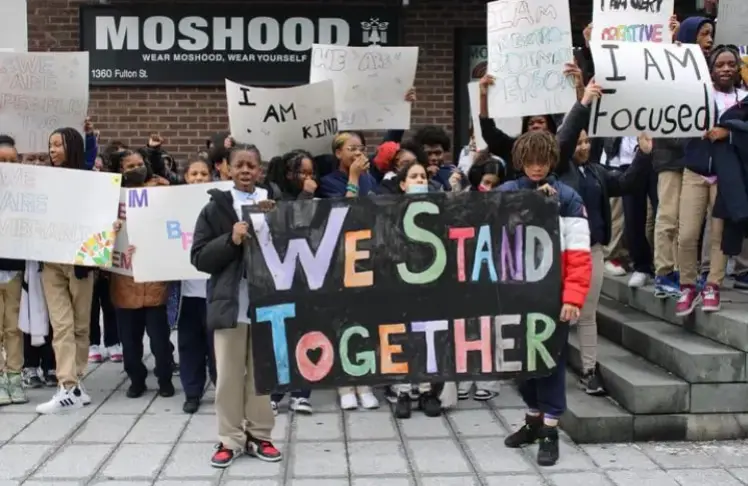
by Aziah Siid
We live in an era where a Black teen in Texas can get suspended for wearing his hair in locs, schools in Florida teach that people benefited from enslavement, and books about racism or written by Black authors are regularly banned or challenged in school libraries. And at the start of February, Miami-based iPrep Academy, sent home consent letters that enabled parents to opt their child out of Black History Month events.
“Some people can say Black Lives Matter in School, and some people can’t say it in a district,” says Chanel Hurt, a former teacher and current national staff member of Black Lives Matter At School.
Launched in 2017, the organization champions racial justice in schools and promotes the dignity of Black students and communities. It sparks dialogue, action, and change around these tenets through ongoing initiatives as well as an annual week of action.
Indeed, from Feb. 5-9, students, parents, educators, and community members participated in Black Lives Matter At School Week, speaking out against anti-Blackness in schools, as well as demanding a better, more just educational experience for Black students.
Despite nationwide efforts to suppress teaching about Black lives, this year the Week of Action saw participants in more than 30 states — even in states and districts that are restricted from teaching about racism. In 2023, actions happened in 13 states, Hurt says.
Participants facilitated their own activities — like hosting rallies, engaging in conversations with parents, or hosting virtual events.
“I’m excited about the continued relevance and importance of Black Lives Matter in everyone’s daily life,” Hurt says. She explains that the week is part of “a framework that addresses all of that racial injustice in education and helps facilitate creating that safe and equitable school communities.”
And depending on the level of anti-Blackness in a school, participation in the week sometimes takes place off-campus.
“We’ve been seeing all the different ways people are engaging their community outside the school, and I think that’s why we’re seeing the number jump,” Hurt tells Word In Black.
But no matter what form they take, the actions taking place during Black Lives Matter At School Week all revolve around the movement’s four key demands: ending “zero-tolerance discipline” policies that push Black students into the criminal justice system and replacing them with restorative justice practices, increasing Black teacher representation, requiring Black History/Ethnic Studies across all K-12 levels, and prioritizing funding for counselors over police presence in schools.
“Parents are engaging with their children, teachers are collaborating on lessons, a TV channel is broadcasting Black History, a community association printed out BLM at School coloring books and put them out for customers and local businesses,” Hurt says. “Year after year, people are finding ways to engage with their community because we’ve had to change the way that we’ve done it.”
Supporters of the movement include the National Education Association, which has been vocal about endorsing the week of action and encouraging their members to participate.
“When we join together to rewrite the rules, we make our schools places where students can investigate, innovate, and make mistakes & missteps — and that’s better for all of us,” the NEA wrote on X, formerly known as Twitter.
The NEA also asked to “create supportive environments where all students can learn, grow, and thrive.”
Specific ways the NEA said schools can start creating those healthier environments include enacting effective approaches to discipline and improving restorative justice practices. Examples of how that can be done include ending suspensions and arrests for minor infractions, and ensuring school personnel are equipped to diffuse conflict on campus.
The blame for problems in schools often falls squarely on the shoulders of Black parents, teachers, and, most perplexingly, the students themselves. But what Black Lives Matter At School week shows is that these are the people who have solutions — and are committed to transforming public education.
“Our theme this year is collective value, and that’s what I’m really looking forward to,” Hurt says. “When we recognize that our liberation is interwoven and connected, and we recognize the strength that comes with our unity, we then have the strength and the energy to take down the systems that continue to move us farther away from our shared humanity.”















